
CANADIAN VETERINARY JOURNAL-REVUE VETERINAIRE CANADIENNE
Scope & Guideline
Bridging theory and practice in animal health.
Introduction
Aims and Scopes
- Clinical Veterinary Science:
The journal primarily publishes research related to clinical practices in veterinary medicine, including diagnosis, treatment, and management of various animal diseases across species. - One Health Approach:
A significant focus on the One Health perspective, integrating human, animal, and environmental health, reflecting the interconnectivity of these domains in veterinary practice. - Veterinary Education and Professional Development:
The CVJ emphasizes the importance of veterinary education, exploring innovative teaching methods and the continuous professional development of veterinarians. - Epidemiology and Disease Control:
Research on epidemiological trends, disease outbreaks, and control measures, particularly in food animals, reflects the journal's commitment to public health and animal welfare. - Emerging Technologies in Veterinary Medicine:
The journal explores the application of new technologies and methodologies in veterinary practice, including telemedicine, diagnostic tools, and treatment protocols.
Trending and Emerging
- Telemedicine and Remote Veterinary Care:
The rise of telemedicine in veterinary practice has gained significant attention, particularly in response to the COVID-19 pandemic, emphasizing the need for flexible veterinary care options. - Mental Health and Well-being of Veterinarians:
There is an increasing focus on the mental health of veterinary professionals, addressing issues of burnout, compassion fatigue, and the importance of mental wellness in sustaining a healthy workforce. - Antimicrobial Resistance and Stewardship:
Research on antimicrobial resistance, especially in food animals, is trending as veterinarians and researchers work towards better practices and guidelines for antibiotic use. - Innovative Diagnostic Techniques:
Emerging diagnostic methods, including advanced imaging and molecular diagnostics, are becoming a focal point as they improve disease detection and management. - Holistic and Integrative Approaches to Animal Care:
A growing interest in holistic veterinary care that incorporates alternative therapies alongside conventional medicine reflects an evolving understanding of animal health and wellness.
Declining or Waning
- Traditional Surgical Techniques:
There has been a noticeable decline in articles solely focused on traditional surgical techniques as the field moves towards minimally invasive and technologically advanced methods. - Historical Perspectives in Veterinary Medicine:
Research exploring historical aspects of veterinary medicine, such as historical case studies or retrospective analyses, appears to be waning as contemporary issues gain more attention. - In-depth Pharmacological Studies:
Fewer studies are being published that focus solely on pharmacological evaluations of drugs, suggesting a shift towards integrated approaches that combine pharmacology with clinical outcomes or broader veterinary practices. - Animal Welfare Legislation:
While still a critical area, the frequency of papers focusing specifically on legislative aspects of animal welfare has decreased, potentially overshadowed by more pressing clinical and practical applications. - Specific Breed Studies:
Research focused exclusively on specific breeds or breed-related health issues is becoming less common, as a more holistic approach to veterinary health that encompasses various breeds is being favored.
Similar Journals

JOURNAL OF SMALL ANIMAL PRACTICE
Pioneering excellence in small animal practice.Welcome to the Journal of Small Animal Practice, a leading publication in the field of veterinary science, dedicated to advancing the knowledge and practice of small animal healthcare. Published by Wiley since 1960, this esteemed journal has established itself as a cornerstone in the veterinary community, boasting an impressive Q1 ranking in the small animals category as of 2023. With a Scopus rank of #5 out of 20, it places in the top 77th percentile, emphasizing its influence and reach within research domains. The Journal of Small Animal Practice serves as a vital platform for disseminating cutting-edge research, clinical studies, and reviews aimed at veterinary professionals and students alike. Although it does not offer open access, the journal's rigorous peer-reviewed process ensures high-quality content that significantly contributes to the field. Join the community of scholars and practitioners who rely on this journal to stay informed on emerging trends and best practices in small animal health.

Thai Journal of Veterinary Medicine
Connecting knowledge to practice in veterinary medicine.Thai Journal of Veterinary Medicine, published by Chulalongkorn University, serves as a vital resource for researchers, practitioners, and students in the field of veterinary science. With an ISSN of 0125-6491, the journal has been providing a platform for the dissemination of original research and reviews since its inception, with a focus on advancing veterinary practice and animal health in Thailand and the broader Southeast Asian region. The journal is recognized in the Scopus database, currently ranked in the Q4 category for Veterinary (miscellaneous), reflecting its commitment to quality despite being in a highly competitive space. The scope of the journal encompasses a wide array of topics pertinent to veterinary medicine, ensuring accessibility to diverse veterinary disciplines. While the journal currently does not offer an open-access option, it remains dedicated to contributing valuable knowledge and insights to the veterinary community, supporting the improvement of animal welfare and public health initiatives in the region. As it continues to publish until 2024, the Thai Journal of Veterinary Medicine invites contributions that align with its objectives of fostering scholarly discourse and advancing veterinary research.

BMC Veterinary Research
Advancing veterinary science through open access.BMC Veterinary Research, published by BMC in the United Kingdom, stands as a pivotal open-access platform dedicated to advancing the field of veterinary science since its inception in 2005. With an impressive impact factor that reflects its influential presence, this journal has achieved a remarkable ranking of #17 out of 194 in the Scopus Veterinary category, placing it in the 91st percentile among its peers. The journal serves as an essential resource for researchers, professionals, and students alike, fostering the dissemination of high-quality research and innovative practices within the veterinary and broader medical communities. With its commitment to open access, BMC Veterinary Research ensures that valuable insights are accessible to all, promoting collaboration and knowledge sharing that drive the advancement of veterinary sciences. As it continues to publish significant findings until 2024, it remains a key contributor to the contemporary discourse on animal health and welfare.
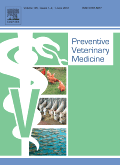
PREVENTIVE VETERINARY MEDICINE
Leading the way in veterinary epidemiology and herd health management.PREVENTIVE VETERINARY MEDICINE, published by Elsevier, is a premier academic journal dedicated to advancing the field of veterinary science, with a particular focus on the prevention of diseases in food animals. With an impressive impact factor that reflects its stature in the academic community, this journal is categorized in the Q1 quartile across both Animal Science and Zoology and Food Animals categories, underscoring its significance in agricultural and biological sciences. Established in 1982, the journal is known for its rigorous peer-reviewed articles and research insights that contribute significantly to veterinary epidemiology, herd health management, and disease prevention strategies, fostering a closer connection between veterinary practitioners and researchers. By offering a platform for high-quality research that enhances animal health and productivity, PREVENTIVE VETERINARY MEDICINE serves as an essential resource for researchers, veterinarians, and students aiming to stay at the forefront of veterinary innovations and practices.

Acta Veterinaria Eurasia
Breaking barriers in veterinary research and education.Acta Veterinaria Eurasia is a prominent open access journal dedicated to advancing the field of veterinary sciences. Published by AVES since 2002, it aims to provide a platform for innovative research and insights that enhance veterinary practices and animal welfare. With its ISSN 2618-639X and E-ISSN 2619-905X, the journal has established a growing international reputation, particularly in Turkey, and is indexed in major databases. As of 2023, it is positioned in Q4 of the Veterinary (miscellaneous) category and holds a Scopus rank of #138 out of 194 in the general veterinary domain, placing it in the 29th percentile. The journal spans a broad scope within veterinary studies, inviting contributions that foster knowledge dissemination and collaboration among researchers, professionals, and students alike. By promoting open access since its inception, Acta Veterinaria Eurasia is committed to making cutting-edge research accessible to all, ultimately supporting improved health outcomes in veterinary practice.

BERLINER UND MUNCHENER TIERARZTLICHE WOCHENSCHRIFT
Advancing Veterinary Knowledge Since 1946BERLINER UND MUNCHENER TIERARZTLICHE WOCHENSCHRIFT is an esteemed journal in the fields of Veterinary Science and Medicine, published by SCHLUETERSCHE VERLAGSGESELLSCHAFT MBH & CO KG. Since its inception in 1946, this journal has served as a vital platform for advancing knowledge and research in veterinary medicine within Germany and beyond. With a current impact factor that places it in the Q4 category in both Medicine and Veterinary, it continues to provide significant insights for professionals, researchers, and students engaged in the veterinary community. Although it is not an Open Access journal, its rich content contributes to the foundational literature of the field, making it an essential reference. Researchers looking to publish their findings or keep informed on the latest advancements in veterinary and medical practices will find this journal an invaluable resource. It is headquartered in Hannover, Germany, and serves as a testament to the ongoing dedication to veterinary research since the mid-20th century.
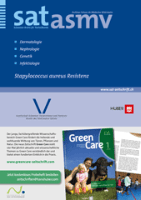
SCHWEIZER ARCHIV FUR TIERHEILKUNDE
Fostering excellence in animal welfare through scholarly exchange.SCHWEIZER ARCHIV FUR TIERHEILKUNDE is a prestigious journal published by the GESELLSCHAFT SCHWEIZER TIERARZTINNEN & TIERARZTE, dedicated to advancing the field of veterinary science. With the ISSN 0036-7281 and E-ISSN 1664-2848, this esteemed journal has been a vital source of knowledge since its inception in 1945, evolving through converged years up to 2024. It plays a significant role in the veterinary community, reflected by its 2023 ranking in the Q2 category for veterinary (miscellaneous) research, placing it within the 48th percentile among its peers. Although it does not currently offer Open Access options, the journal remains a trusted outlet for researchers, professionals, and students looking to stay abreast of the latest findings and practices in veterinary medicine. Published in Switzerland, it serves as a bridge for sharing innovative ideas and solutions in animal healthcare, emphasizing the importance of community and collaboration in improving animal welfare.
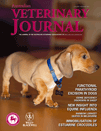
AUSTRALIAN VETERINARY JOURNAL
Elevating animal health through innovative insights.AUSTRALIAN VETERINARY JOURNAL, published by Wiley, is a leading journal dedicated to advancing the field of veterinary science. With a rich history dating back to 1925, this journal has become a vital resource for researchers, professionals, and students interested in veterinary medicine and its diverse applications. As evidenced by its impressive Scopus ranking, placing it in the 67th percentile among General Veterinary publications, and categorized within Q3 of the Medicine (miscellaneous) and Q2 of the Veterinary (miscellaneous) quartiles for 2023, AUSTRALIAN VETERINARY JOURNAL is recognized for its commitment to quality research and impactful contributions. Although not an open access journal, it continues to be an essential platform for disseminating vital findings and innovations within the veterinary community, fostering collaboration and advancement in animal health and welfare.
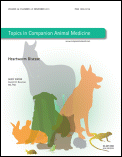
Topics in Companion Animal Medicine
Connecting researchers and practitioners for better pet care.Topics in Companion Animal Medicine is a prominent journal dedicated to the field of veterinary medicine, specifically focusing on small animals. Published by W B SAUNDERS CO-ELSEVIER INC, the journal boasts a commendable impact factor and ranks in the Q2 category among its peers, placing it 7th out of 20 in the veterinary small animals category according to Scopus metrics. With its ISSN 1938-9736 and E-ISSN 1946-9837, this journal features a diverse range of topics from clinical practices to innovative research, aimed at enhancing the health and well-being of companion animals. Since its inception in 2008, it has provided a crucial platform for disseminating knowledge and fostering discussion among researchers, veterinarians, and students alike. The journal's commitment to quality and relevance makes it an indispensable resource for those involved in the veterinary profession and companion animal care.
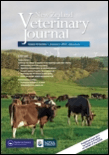
NEW ZEALAND VETERINARY JOURNAL
Advancing animal health through rigorous research.NEW ZEALAND VETERINARY JOURNAL, published by Taylor & Francis Ltd, stands as a pivotal platform in the realm of veterinary science, contributing significantly to the global discourse on animal health and welfare since its inception in 1952. With an ISSN of 0048-0169 and an E-ISSN of 1176-0710, this journal offers invaluable insights within both the veterinary and general medical fields, currently achieving a commendable Q2 ranking in Veterinary (miscellaneous) and Q3 in Medicine (miscellaneous) for 2023. Its Scopus ranking places it in the 76th percentile among veterinary journals, affirming its high-impact presence in academia. While access to this journal is not open, it maintains an essential role for researchers, professionals, and students aiming to advance their knowledge and contribute to the field of veterinary science. With a commitment to disseminating quality research, NEW ZEALAND VETERINARY JOURNAL enriches the understanding of veterinary practices and enhances ongoing dialogue on critical health issues affecting animals, promoting better outcomes through scientific inquiry.